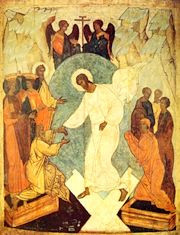Word of the Day / Pascha

Shoshana Kordova – 1/4/13
As Christians around the world celebrate what they believe to be the resurrection of Jesus, let’s talk about what to call the holiday.
In the English-speaking world, it’s generally referred to as “Easter,” but the Eastern Orthodox Church prefers the name Pascha (PAS-kha). That’s also the word used in Hebrew todayand is closely related to the Hebrew word for Passover (Pesach) and the Aramaic word for the Jewish holiday (Pischa).
In an article called “It is Pascha not Easter!” that appears on the Orthodox Research Institute website, the late priest Michael Harper argued in favor of using the Aramaic (and Greek) word rather than the apparently pagan-derived English one.
The seventh-century English scholar the Venerable Bede says the name “Easter” comes from that of the Anglo-Saxon goddess Eostre, who is associated with spring and fertility, according to Christianity Today.
Harper wrote that the name “has no associations whatsoever with Christ, His death and Resurrection, or indeed anything Christian,” asking, “Is it not, therefore, unsuitable to be used to describe the greatest day in the life of the Church?”
The name Pascha also conjures up the Christian imagery of Jesus as the paschal lamb that, in Christian theology, stands in for the animals the Jews used to sacrifice in the Temple on Passover. The idea comes from 1 Corinthians, which states: “Christ, our Paschal lamb, has been sacrificed.”
Though English-speaking Catholics typically refer to the holiday as Easter, the lamb symbolism is at least as important in Catholicismas in the Orthodox Church.
“In his passion and death, Jesus reveals himself as the Lamb of God, ‘sacrificed’ on the Cross, to take away the sins of the world,” Pope Benedict XVI said in his Easter homily in 2009. “He was killed at the very hour when it was customary to sacrifice the lambs in the Temple of Jerusalem. The meaning of his sacrifice he himself had anticipated during the Last Supper, substituting himself – under the signs of bread and wine – for the ritual food of the Hebrew Passover meal. Thus we can truly say that Jesus brought to fulfillment the tradition of the ancient Passover, and transformed it into his Passover.”
Both Christian and Jewish or Israeli sources use Passover as a reference point for the holiday celebrated by the other religion. “Our observance of the Resurrection is related to the ‘Passover of the Jews’ in a historical and theological way,” states a 1994 article by the Antiochian Orthodox Christian Archdiocese of North America called “The Date of Pascha.” On the flip side, the Even Shoshan dictionary defines Pascha as “an accepted name for the Passover of the Christians.”
Jews don’t believe that Passover has been supplanted by Easter, or that Jesus has replaced the paschal lamb. But in using the same root for the names of both holidays, Israelis and Christians of various nationalities who refer to Pascha are reflecting the shared historical roots of both spring festivals.

75012 288050hello!,I love your writing very so much! 16775
923866 815546I ought to appear into this and it would be a difficult job to go more than this completely here. 75642